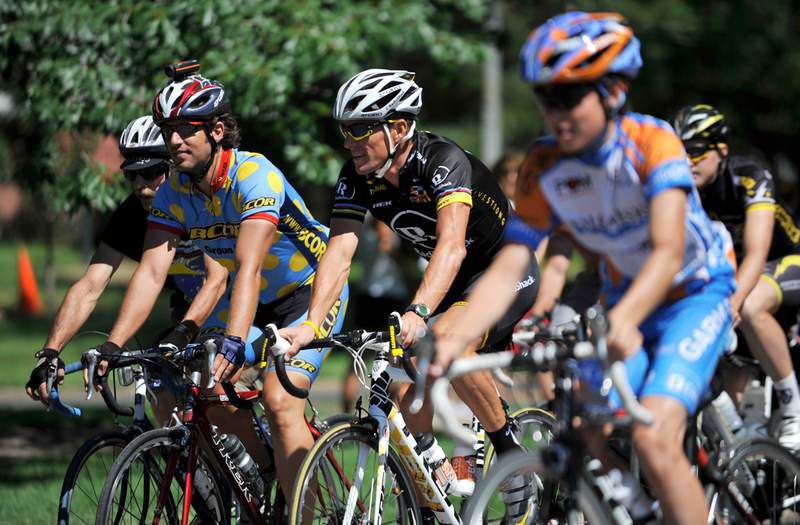Cyclists said to back claims Armstrong doped
Published 5:00 am Thursday, August 5, 2010

- Seven-time Tour de France winner Lance Armstrong, center, leads a column of hundreds of fellow cyclists during a ride through Washington Park in Denver on Wednesday in support of an announcement of a major pro cycling race that will be staged in Colorado next year. For more details, see Sports in Brief, at right. Federal investigators are looking into Armstrong's possible use of performance-enhancing drugs.
Federal prosecutors have intensified their criminal investigation of the cyclist Lance Armstrong since the Tour de France ended last month. They questioned many of his former associates — including cyclists who have supported and further detailed claims that Armstrong and his former U.S. Postal Service team participated in systematic doping, according to a cyclist who has been interviewed and two others privy to the inquiry.
In May, Armstrong’s former teammate Floyd Landis shocked the cycling world by publicly accusing Armstrong and other team members of using performance-enhancing drugs and blood transfusions to gain an unfair advantage. Landis said that Armstrong — the biggest name in the sport — had encouraged the doping and that the team had sold its bikes to help finance an expensive doping program.
Trending
Armstrong has denied any wrongdoing and has said that Landis, who was stripped of his 2006 Tour title for doping and recently completed a two-year ban from the sport, had no credibility.
But now, prosecutors and investigators have more than Landis’ account to go on, according to the two people with knowledge of the investigation. They requested anonymity because they did not want to jeopardize their access to sensitive information.
A former teammate of Armstrong’s said in a telephone interview Wednesday that he has spoken with investigators. He said he detailed some of his own drug use, as well as the widespread cheating that he said went on as part of the Postal Service team — all of which was done with Armstrong’s knowledge and encouragement.
The rider, who has never tested positive for performance-enhancing drugs or methods, asked that his name not be used because investigators advised him not to speak publicly about the information he provided. He has not been called before the grand jury that has been convened in Los Angeles to investigate the case.
Riders have been compelled to come forward. Tyler Hamilton, who is serving an eight-year ban for using performance-enhancing drugs, has met with the grand jury, those who have been briefed on the case said. His lawyer, Chris Manderson, said that Hamilton had received a grand jury subpoena but did not say whether Hamilton had already provided testimony.
Armstrong is considered one of the most remarkable athletes in American history, someone who dominated his sport and also had a compelling personal story, having beaten testicular cancer.
Trending
Jeff Novitzky, a special agent for the Food and Drug Administration, is in charge of the investigation and has been interviewing Armstrong’s former teammates and associates. Novitzky — the head investigator in the Bay Area Laboratory Co-Operative steroids case — is trying to determine if Armstrong, his teammates, the owners or managers of his former team conspired to defraud their sponsors by doping to improve their performance and win more money and prizes.
Armstrong did not respond to requests for comment put directly to his agent and his manager on Wednesday.
Toward the end of the Tour de France, Armstrong, a seven-time winner of the event, said he would deny any involvement in doping “as long as I live.”
Bryan D. Daly, a defense lawyer representing Armstrong, said any cyclists who claim that Armstrong had doped were not telling the truth.
“They just want them to incriminate Lance Armstrong and that’s my concern,” Daly said, adding that the prosecutors were working closely with the U.S. Anti-Doping Agency to pressure Armstrong’s former teammates. “To the extent that there’s anyone besides Floyd Landis saying things, the bottom line is, if you take away the soap opera and look at the scientific evidence, there is nothing.”
Daly said the reasons behind the investigation were still “very murky for us.”
“If Lance Armstrong came in second in those Tour de France races, there’s no way that Lance Armstrong would be involved in these cases,” Daly said. “I think that the concern is that they are caught up in the pursuit of a celebrity to catch him in a lie.”
The federal prosecutor Doug Miller is in charge of the case. Prosecutors are moving the case along because the 10-year statute of limitations on some of the alleged crimes they are investigating is due to expire next spring.
Several of Armstrong’s former employees and teammates — including George Hincapie, the U.S. national road racing champion — had been contacted by Novitzky before the Tour de France, which began in early July. Hincapie’s lawyer, Zia F. Modabber, has said that Hincapie was likely to talk to Novitzky once the Tour was over. Modabber, who is based in Los Angeles, did not return a phone call or an e-mail on Wednesday.
Cyclists called to meet with Novitzky or testify before the grand jury may run into their own problems if they don’t tell the truth and are later caught lying. In the Balco case, the track and field sprinter Marion Jones received six months in prison, in part for lying to investigators about her use of performance-enhancing drugs.








